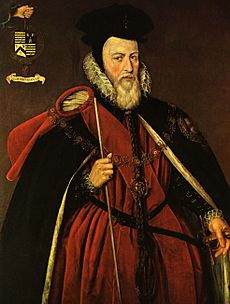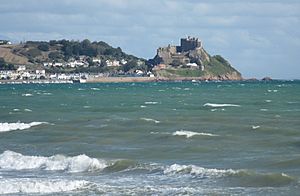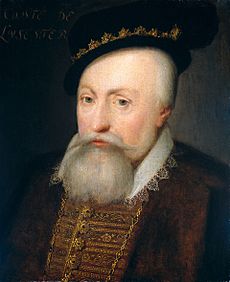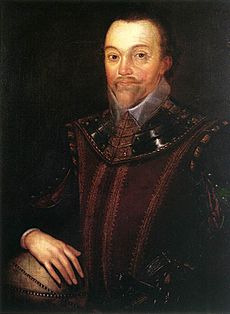Henry Ughtred facts for kids
Quick facts for kids
Henry Ughtred
|
|
|---|---|
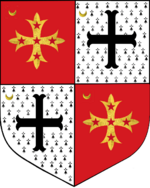
Arms of Ughtred, Kexby: Gules, on a cross patonce Or, five mullets of the first.
|
|
| Member of Parliament for Marlborough |
|
| In office 1584–1585 |
|
| Member of Parliament for Great Bedwyn |
|
| In office 1589–1589 |
|
| Personal details | |
| Born | c. 1533 |
| Died | June 1599 (aged 65–66) Limerick, Ireland |
| Spouse | Elizabeth Paulet |
| Parents | |
Sir Henry Ughtred (born around 1533 – died June 1599) was an important merchant and shipbuilder. He lived during the time of Queen Elizabeth I. One of his ships, the Leicester, even sailed with Sir Francis Drake against the Spanish Armada.
Henry Ughtred was also a Member of Parliament (MP). He represented Marlborough in 1584 and Great Bedwyn in 1589. He owned a lot of land and was involved in the Plantations of Ireland. He was made a knight by the Lord Deputy of Ireland in 1593. Henry was the son of Sir Anthony Ughtred and Elizabeth Seymour. Elizabeth was the sister of Jane Seymour, who was the third wife of Henry VIII. Henry Ughtred married Elizabeth Paulet sometime after 1557.
Contents
His Family and Early Life
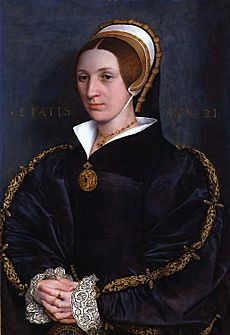
Portrait of a Lady, probably a Member of the Cromwell Family, perhaps Elizabeth Seymour, c.1535–1540, by Hans Holbein the Younger.
|
Henry Ughtred was born around 1533. His birthplace was Mont Orgueil castle on the island of Jersey. His father was Sir Anthony Ughtred, who was the governor of Jersey. His mother was Elizabeth Seymour. Her father was Sir John Seymour of Wolf Hall.
Sir Anthony Ughtred passed away in Jersey in 1534. After his father's death, Henry's mother moved back to Kexby, Yorkshire. The King had given this land to Henry's parents for their lives.
In 1537, Henry's mother married Gregory Cromwell. He was the son of Thomas Cromwell, a powerful minister to King Henry VIII. After Gregory Cromwell died, she married Sir John Paulet in 1554. She died in 1568.
After his stepfather, John Paulet, died in 1576, Henry Ughtred had a long argument with his stepbrother, William Paulet. William accused Henry of not managing their father's property correctly. This disagreement caused Henry a lot of trouble. He even wrote to William Cecil, 1st Baron Burghley, a very important person, to defend himself. Henry said the accusations were unfair and that the case cost him a lot of money and time. He was even held in Fleet for some months because of this issue. The dispute continued for many years.
His Career
Henry Ughtred held several important jobs. He was a justice of the peace in Hampshire from 1575 to 1593. He was also the sheriff of Hampshire from 1581 to 1582. Later, he became a member of the council of Munster in Ireland in 1587. He was also the captain of Netley Castle in Hampshire.
As a Member of Parliament
Ughtred was chosen to be a Member of Parliament (MP) for Marlborough in 1584. He was also an MP for Great Bedwyn in 1589. He likely got these positions because of his family's influence, especially the Seymour family. His cousin, Edward Seymour, 1st Earl of Hertford, was very powerful in these areas.
In Parliament, Henry Ughtred worked on important issues. In 1585, he helped discuss laws about poor people. He also spoke about how money was being spent on houses for the poor. He believed that too much money was being wasted. He also thought that sending homeless people back to their home villages was unfair. He said these villages already had too many poor people to support.
In 1589, he joined a committee about money for the Queen. He also spoke about a bill concerning soldiers.
As a Shipowner and Shipbuilder
Henry Ughtred was a successful shipowner. He knew that sailors often became jobless after a voyage. He also saw ships left to rot because owners could not afford repairs.
He built several ships. One of his ships, the Galleon (500 tons), was very large. He also owned the Elizabeth (140 tons) and the Joan (80 tons).
One of his most famous ships was the Ughtred, also called the Bear. It was worth a lot of money. This ship was later renamed the Leicester, likely to honor Robert Dudley, 1st Earl of Leicester. The Leicester sailed with Sir Francis Drake in 1585-86. It was part of the fleet that fought against the Spanish Armada.
Ughtred also faced legal problems because of his trading. In 1582, a Spanish ambassador complained that Ughtred's ships had robbed Spanish ships near Newfoundland.
Landowner in Ireland
Sir Henry Ughtred was one of many English people who gained land in Ireland. This happened during the Plantations of Ireland. The English crown took land from Irish landowners who rebelled. Then, English and Welsh settlers moved onto this land.
In 1586, Henry Ughtred and others were given land in Connoll and Kerry. However, some Irish people claimed these lands were theirs. This led to many lawsuits for Henry. Even though he won some cases, the issues were not fully solved.
The Munster Plantation in the 1580s was a big settlement project. It happened after the Desmond Rebellions. The English wanted to settle the area with colonists from England and Wales. These new settlers were meant to help prevent future rebellions. The English landowners were supposed to bring tenants from England. They were also meant to build towns and defend the areas. However, many landowners did not bring enough men for defense. This caused big problems later.
When the Nine Years' War (an Irish rebellion) started in 1598, many English settlers had to leave their homes. Some fled to walled towns or back to England. Others faced great danger.
His Marriages
Henry Ughtred was married twice. His first wife was Elizabeth Paulet. She died in 1576. Elizabeth was the daughter of his stepfather, John Paulet, 2nd Marquess of Winchester. Henry became the stepfather to Elizabeth's children from her first marriage, including Sir William Courtenay.
After Elizabeth died, Henry Ughtred married a second time. He did not have any children with either of his wives.
His Death
In October 1598, Sir Henry Ughtred and his wife left their home in Ireland. They fled to Limerick, about fifteen miles away. His castles were reported to be abandoned. A few days later, his castle of Mayne was burned by Irish rebels.
Henry Ughtred died in Limerick in June 1599. By 1603, his widow had returned to England. Later, she sold their lands in Ireland.
Images for kids
 | Ernest Everett Just |
 | Mary Jackson |
 | Emmett Chappelle |
 | Marie Maynard Daly |


